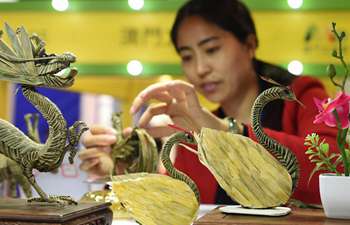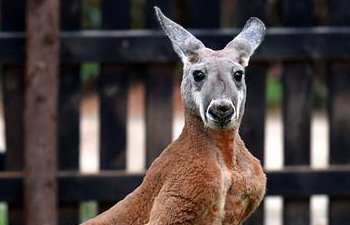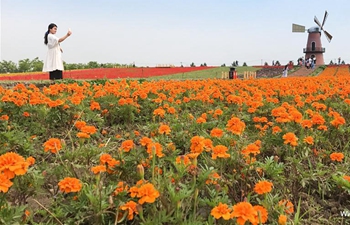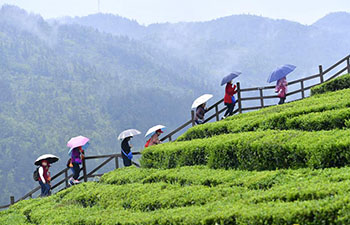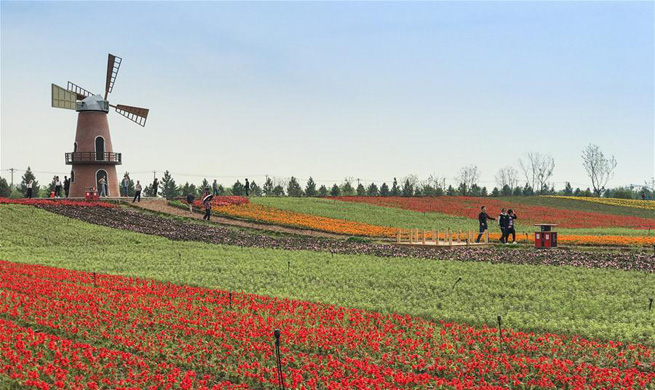by Peter Mutai
NAIROBI, April 27 (Xinhua) -- Scientists from the global maize research center vowed Thursday to intensify research to eradicate fall armyworms that had invaded hundreds of farms in various regions across Africa.
International Maize and Wheat Improvement Center (CIMMYT) researchers said in Nairobi they are currently screening elite maize germplasm to help identify possible sources of resistance.
Badupolli Prasanna, CIMMYT Director for Global Maize Program, said the center is capable of applying its vast germplasm resources as well as modern breeding tools to speed up breeding process.
"Breeding for fall armyworm resistant elite maize hybrids adapted to Sub-Saharan Africa (SSA) would require intensive germplasm screening and collaborative work with public and private sector," Prasanna told an international stakeholders forum in Nairobi.
The presence of the fall armyworm has added another threat to fighting maize diseases in continent since the citing of Maize Lethal Necrosis (MLN) disease in 2011 hence the need for the meeting to come up with the possible solutions.
The fall armyworm, a pest that was introduced to Africa from the Americas, was first reported in Nigeria last year and has since spread to southern and eastern African countries, causing severe damage in crop losses in the continent.
Its larvae feed on leaves and can destroy up to 70 percent of the crop they invade. The damage appears as ragged-edged holes on leaves.
Zambia has confirmed reports that almost 90,000 hectares of their maize have been affected. It has also affected 17,000 hectares in Malawi, 130,000 hectares in Zimbabwe and 50,000 hectares in Namibia respectively.
"Bt maize varieties that are resistant to drought and pests is a potential solution against the pest but this variety yet to go through National Performance Trials (NPT) that might take between four to five years," Prasanna noted.
Candace Buzzard, the U.S. International Development Agency (USAID) Deputy Director for Kenya and East Africa, called on regional economic powers to help mobilize resources for research against the pest.
Buzzard called on scientists to harness science and information globally and engage with farmers at all times.
To date, smallholder farmers in Eastern, Southern and Western Africa are facing a major threat to their crops from the fall armyworm, which has so far damaged almost 300,000 hectares of maize.
Many countries are currently keeping the pest in check through costly pesticides, which could be potentially reduced through an integrated pest management (IPM) strategy.
Prasanna noted that at the moment, the IPM is the best possible solution to effectively tackling the pest in both the short and long term.
Kenya's agriculture ministry has identified a variety of crops that the pest is ravaging, including cereals such as sorghum, millet, rice, millet, wheat, maize and barley.
Pasture grasses like Bermuda, hay and Napier grass are also being attacked by the pest, the minsitry said.
The ministry noted that the armyworm is a migratory pest, with the adult pest having a capacity to fly over 30km drifting through air current.
Farmers in different parts of East Africa's biggest economy, especially those in maize growing areas of Western Kenya and wheat growing areas like Nakuru and Uasin Gishu, have reported armyworm infestation.
The invasion spells a huge trouble for citizens, who consume up to 4 million bags of maize every month, according to the ministry, with the country producing only 40 million bags annually and the rest is imported.
The UN Food and Agriculture Organization (FAO) Kenya Country Representative Gabriel Rugalema called on African countries to intensify monitoring and surveillance and moderate spraying of the pest pending the findings of other scientific solutions.
"The regional countries require timely information from farmers and financial resources to help tame the pests from spreading further to other countries," Rugalema said.
The fall armyworm has a preference for maize, sorghum, potatoes, sugarcane, cotton, tobacco, spinach, crucifers, cucumber, sweet potatoes, beans, cowpea, soybean, groundnut, banana and grazing pastures.
The two-day meeting is being attended by 130 experts and stakeholders from African governments, international and national agricultural research organizations, non-governmental organizations, national plant protection organizations, development partners and donor agencies.




